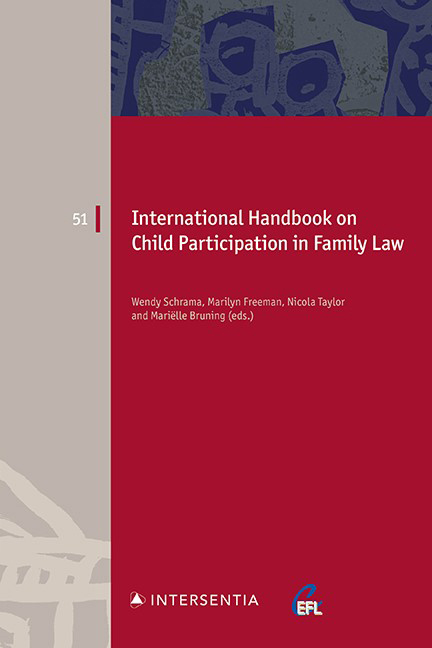Book contents
Child Participation in Family Law Proceedings: Pedagogical Insights on Why and How to Involve Children
Published online by Cambridge University Press: 10 December 2021
Summary
INTRODUCTION
Today, an increasing number of children are growing up in single-parent families. For example, in the Netherlands, one fifth of all minor children have parents who are separated or divorced (i.e. 727,000 children). In the European Union, 17% of children live in a single parent household. Parental separation is predominantly a Western phenomenon. In countries such as South Korea, Nepal and Ethiopia, children primarily report that they always (or usually) live in one home and not regularly in two homes. As will be discussed below, parental separation may involve conflicts that put children in a vulnerable and sometimes threatening position. Consequently, the question regarding why and how to involve children in post-separation decisions (such as custody, care and contact arrangements) often arises in these kinds of family law proceedings in particular. Therefore, the focus of this contribution will be narrowed to judicial proceedings in the context of divorce. However, the pedagogical insights that we provide in this contribution are not exclusively relevant for cases of divorce. Rather, we will discuss general theories and principles that are important for other family law proceedings as well (such as legal parentage, international child abduction and adoption).
Numerous studies have shown that parental separation is associated with lower levels of child wellbeing after the separation of the parents. A lack of resources, both emotional and financial, due to living with one parent after separation has been found to be one of the most important factors contributing to lower levels of child wellbeing, next to parental conflicts. For example, an important consequence of parental separation is that children have a higher likelihood of growing up in poverty. Specifically, single mothers more often depend on social welfare, compared to single fathers. Steinbach concludes from a meta-analysis on custody arrangements after divorce that children are slightly better offin joint physical custody arrangements with regard to their overall wellbeing (i.e. emotional and financial resources), compared to children living with only one parent (i.e. sole physical custody). Parental separation can also have negative effects on children's school achievement, self-esteem and psychological adjustment. 7 Parental conflict (pre-and post-separation) is considered a key stressor for children and negatively affects their wellbeing. This is even more predictive of children's wellbeing than parental separation alone.
- Type
- Chapter
- Information
- Publisher: IntersentiaPrint publication year: 2021
- 2
- Cited by



